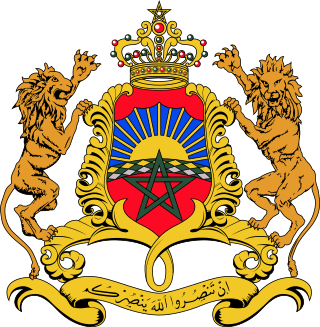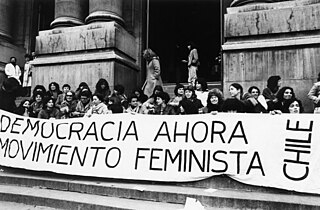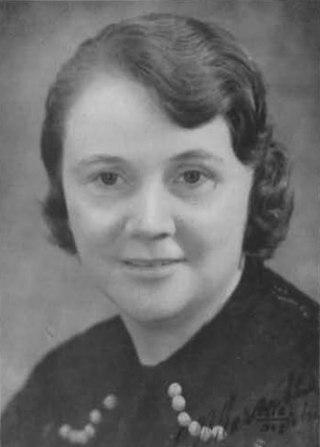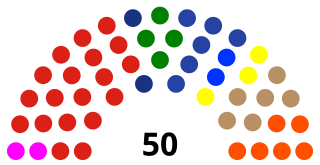Aspect of women's rights in Columbia
Women's suffrage in Colombia was introduced in 1954. [1] The reform was introduced during the military dictatorship of Gustavo Rojas Pinilla.
| Part of a series on |
| Feminism |
|---|
 |
Women's suffrage in Colombia was introduced in 1954. [1] The reform was introduced during the military dictatorship of Gustavo Rojas Pinilla.
The Constitution of the Province of Velez explicitly granted women suffrage in 1853, but the right was rescinded when the Velez Constitution was abolished in 1855. [2] The women's movement in Colombia started late compared to other countries. During the 1930s, a women's movement organized. Women were granted the right to keep their legal majority after marriage in 1932 and attend university in 1934, and feminists started to lobby the Parliament members to lift the issue of women's suffrage. The suffrage movement was mainly focused around the two biggest cities and consisted of well educated elite women from Liberal and Socialist families from the middle and upper classes.
When a female lawyer was rejected from her quest to become a judge in 1944, women organized in the Liberal Union Femenina de Colombia (UFC) in 1944 and the Socialist Alianza Femenina in 1945 to demand women's suffrage. In the public debate, the matter was long a question of only suffrage and not the right to be elected. The Liberal and Socialist party supported the reform. The conservatives initially did not, however the Catholic church came to support it after the Pope had claimed that women, whom he trusted to be conservative, would be a good force in the fight against Communism if granted suffrage. [3]
Women's suffrage is the right of women to vote in elections. Several instances occurred in recent centuries where women were selectively given, then stripped of, the right to vote. In Sweden, conditional women's suffrage was in effect during the Age of Liberty (1718–1772), as well as in Revolutionary and early-independence New Jersey (1776–1807) in the US.

Women's suffrage – the right of women to vote – has been achieved at various times in countries throughout the world. In many nations, women's suffrage was granted before universal suffrage, in which cases women and men from certain socioeconomic classes or races were still unable to vote. Some countries granted suffrage to both sexes at the same time. This timeline lists years when women's suffrage was enacted. Some countries are listed more than once, as the right was extended to more women according to age, land ownership, etc. In many cases, the first voting took place in a subsequent year.

Parliamentary elections were held in Morocco on 25 June 1993, having originally been scheduled for October 1990, but postponed due to issues over the future of Western Sahara and a referendum on a new constitution, which took place in 1992. The number of directly elected seats increased from 204 to 222, whilst the number of indirectly elected seats rose from 102 to 111. The indirectly elected seats were chosen on 17 September.

Feminism in Chile has its own liberation language and activist strategies for rights that is shaped by the political, economic, and social system of Chile. Beginning in the 19th century, Chilean women have been organizing with aspirations of asserting their political rights. These aspirations have had to work against the reality that Chile is one of the most socially conservative countries in Latin America. The Círculo de Estudios de la Mujer is one example of a pioneering women's organization during the Pinochet dictatorship (1973–1989) which redefined women's responsibilities and rights, linking mothers' rights to women's rights and women's civil liberties. The founding members of the Círculo de Estudios de La Mujer consisted of a small group of Santiago feminists who were from the Academia de Humanismo Cristiano. These women gathered "to discuss the situation of women in Chile", their first meeting drew a crowd of over 300 participants and from there challenged the authoritarian life in Santiago. These women helped shape the rights for women in Chile.

Zdeňka Wiedermannová-Motyčková was a Moravian teacher, journal editor, and women's rights activist. Born into a family of progressive educators, she studied to become a teacher, graduating in 1886. Her Catholic education led her to more conservative values than her family's, but after teaching for several years, she began to recognize the disparities between women and men teachers, as well as those of their students. By 1898, she was publicly calling for equal pay for equal work and campaigning for equal education for boys and girls. In 1902, Wiedermannová founded and became chair of the Moravian Teachers Union, whose focus was to professionalize teaching standards. The following year, she opened a Girls' Academy in Brno, hoping later to include secondary education there. As the Austro-Hungarian Empire provided little funding for girls' education, she held lectures to provide for the operating costs of the academy. Finally in 1908, she successfully established the first girls' secondary school in Moravia.
Mona Lena Krook is an American political scientist. She is a Professor of Political Science at Rutgers University, where she is also the Chair of the Women and Politics Ph.D. Program. She studies the political representation of women, particularly gender quotas in governments and the phenomenon of violence against women in politics.
Marie Louise Emilienne Rochecouste was a Mauritian politician. In 1948 she became the first woman elected to the Legislative Council, serving until 1953.

Cornelia Razoux Schultz-Metzer was a Dutch feminist and politician who was active in the Dutch East Indies. She was the first female member of the colonial legislature, the Volksraad, where she attempted to introduce women's suffrage.
Susan Franceschet is a Canadian political scientist. She is a professor of political science at The University of Calgary. She studies the representation of women both in legislatures and government cabinets, gender quotas for the minimum representation of women in government, and the interaction of gender and public policy. She has written about women's participation in the politics of Chile.

Im Yeong-sin, also known by the English name Louise Yim, was a South Korean educator and politician. She was both the first female minister in South Korea, holding the post of Minister of Commerce and Industry from 1948 to 1949, and the first woman elected to the South Korean parliament, serving from 1949 to 1954. Yim also helped establish Chung-Ang University.
Union Femenina de Colombia (UFC), was a Colombian women's rights organization, founded in 1944. Alongside the Alianza Femenina, it was one of the two big women's organizations campaigning for women's suffrage in Colombia.
Alianza Femenina, was a Colombian women's rights organization, founded in 1945. Alongside the Union Femenina de Colombia, it was one of the two big women's organizations campaigning for women's suffrage in Colombia.
Janet Wesonga, née Tingu is a Ugandan former local politician. As mayor of Mbale, she was Uganda's first African woman mayor. An Anglican, she also served on the Executive Committee of the World Council of Churches.

Karla Máchová was a Czech teacher, women's rights activist, journalist and politician. In 1908, using a legal loophole, Máchová was among the first three women to run for the Bohemian Diet.
Božena Zelinková was a Czech teacher and women's rights activist.

The Bandung City Regional House of Representatives is the unicameral municipal legislature of the city of Bandung, West Java, Indonesia. It has 50 members, who are elected every five years, simultaneously with the national legislative election.

The Surabaya City Regional House of Representatives is the unicameral municipal legislature of the city of Surabaya, East Java, Indonesia. It has 50 members, who are elected every five years, simultaneously with the national legislative election.

The Semarang City Regional House of Representatives is the unicameral municipal legislature of the city of Semarang, Central Java, Indonesia. It has 50 members, who are elected every five years, simultaneously with the national legislative election.